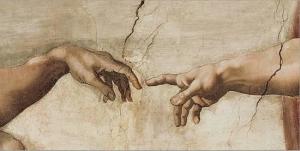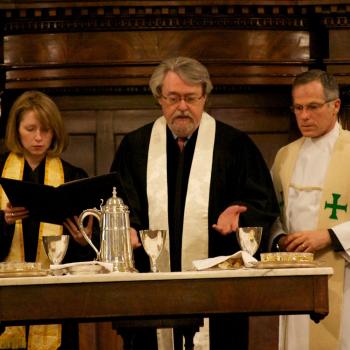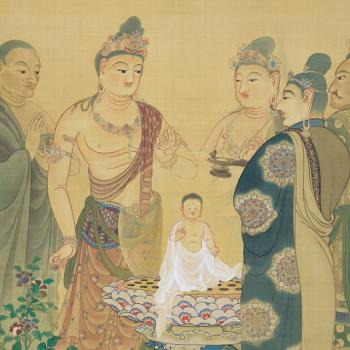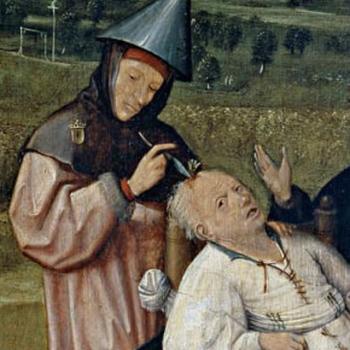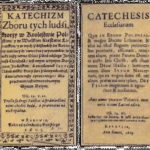Zen Master Juzhi & the Matter of the Finger that Wasn’t There
James Myoun Ford
Whenever the master Jinhua Juzhi was asked about the intimate matter, he simply raised one finger. One day a visitor asked his young attendant what his master taught. The young man raised a finger. When the master heard about this, he cut the young man’s finger with a sharp knife. The attendant began to scream and grasping his bleeding hand ran toward the exit. As he neared the doorway, Juzhi called to him. As the young man turned back to the master, Juzhi held up one finger. His attendant tumbled into the intimate matter.
Gateless Gate, Case 3 (my paraphrase)
This koan is collected in all three of the classic Chinese anthologies used in the reformed Soto curriculum developed by Master Daiun Sogaku Harada, the Gateless Gate, the Blue Cliff Record, and the Book of Serenity. It is somewhat longer in the Gateless Gate, and more challenging. That’s the version I’m citing here.
In the Blue Cliff Record and the Book of Serenity, the case is reduced to “Whenever anyone asked about the intimate way, Master Juzhi would simply raise one finger.” This certainly, if you’ll forgive the word, cuts to the chase. And is certainly worthy of inclusion in the collections that way.
But, I’m taken with the messiness of the larger version. At this point in my life this longer, and more cruel, and, well, bloody version feels more important.
There are several koans that feature acts of violence. I remember one of the first times I heard a dharma talk on the case in which the master Nanquan kills a cat. There’s a set up. But quickly the case turns on the master challenging the assembly, saying if anyone can say a word from the intimate moment, the cat will live. When he doesn’t get a response from the community, I can imagine all sorts of horror in their minds, freezing them in their seats – he kills the cat.
The teacher giving that talk wanted to make sure we understood this was just a story. No one ever actually killed the cat. Another teacher commenting on the same case said it is a real story, but Nanquan only mimed killing the cat.
However, the only talk that actually helped me delve into the matter was from a teacher who said, yes, the cat was killed. Yes, the young man (in other versions a boy) had his finger cut off.
I join the case of the finger and the case of the cat in my heart with the story, not as far as I know collected formally as a koan, of the Ninth century master Yantou Quanhuo. Master Yantou was murdered by bandits. It is said as they stabbed him, he screamed, and the screams could be heard valleys away. This anecdote haunted the young Hakuin Ekaku, and would in many ways become his most important koans.
Koans. As Robert Aitken tells us are a matter to be made clear. As I find it, a pointer and an invitation.
Truthfully, as we take up koan practice, we’re invited into a stripped-down version of reality. The discipline invites us to let the whole of the universe rest within the few words, sentences, paragraphs that shape the koan. Then with fewer distractions we are asked to notice out of our own hearts what is.
It wouldn’t be useful if some of those koans didn’t touch on the violence of life. And, of death.
What I would encourage for anyone taking up this case, or any of the others, would be to set down, just for a moment, questions like should or should not. They’re important. They are about how we live our lives. But, there is also a bit of a cart and a horse here. What is it that guides us and against what do we measure our choices and actions?
What this koan and the others offer is a way into the intimate perspective that when encountered as our own lives and deaths, as the lives and deaths of the stars themselves, well then it frames our choices in the various matters of being. And it all become a little clearer. And our actions more likely to be of help than damaging. There’s more to it than that. But, this is important.
So, for a moment, we can enter a dream world, where judgments are suspended in favor of exploration. This is a perfect case for such an enterprise, as we actually do not know a great deal about the master Juzhi. We have no firm dates for his life and death. He as a dharma successor of the great Hangzhou Tianlong, so it puts him in the eleventh generation from Bodhidharma, and roughly in the ninth century. He lived and taught in Wuzhou, modern Zhejiang Province. Juzhi was one of those characters in the lamp anthologies and koan collections who was put on the path in an encounter with an anonymous woman, often a tea lady, with him a nun. He is known for his practice of chanting the Quanyin chapter, number twenty-five, of the Lotus Sutra. That wonderful haunting call of the heart. And. Well. Not much more.
We can drop all of that, not too many ingredients, after all; into the question that the heart asks. The question our hearts ask. Mine. Yours. Someone who started out a little full of himself but learned quickly that if he wanted to delve into the real matter, he need to learn to bow. And to learn to bow quickly. Maybe even to ask for help.
As oe who needs help, I, too, love the Quanyin chapter.
In the Vermont Zen Center version it begins:
Listen to the actions of Kanzeon
Which have their application to all!
Her vow is deep like the ocean
Unfathomable though kalpas pass
A myriad of Buddhas she has truly served
And made a great, pure vow.
If you hear her name and see her body,
and bear her in mind,
Your life will not be in vain…
There’s a little gender bending in the translation. But, totally appropriate. And definitely the way I experience Kanzeon.
With this case, as with all koans, we are invited to find out who we are in the midst of what actually is. The dream world and this world are one. And, sadly, it is not all beer and skittles. So much hurt. So much.
However. We’re given a promise. Some genuine good news. We hear it in the chapter. We hear it when we find the intimate way for ourselves. There is a place where our troubled hearts are put to ease. This is the goal and the realization of intimacy. Now, fair warning. The wounds do not end. All things made of parts, come apart. Those we love we will lose, or they will lose us.
As the Diamond Sutra calls out to us:
So you should view this fleeting world:
A star at dawn, a bubble in a stream,
A flash of lightening in a summer cloud,
A flickering lamp, a phantom and a dream.
It’s important to note that passing and dream are both true. But there is this additional truth. The dream world and this world are the same world. And, at the same time, as real, as real can be. You cut me I will bleed. And I will hurt. It may be a dream, but it can be a bloody one.
Here we return to the question at hand. At the hand. Juzhi’s hand. That young attendant’s hand.
There is a finger that is used as a universal answer to all questions of the heart. And, then, all of a sudden – it’s gone. Well, there is a spurt of blood. There’s a burning pain. And, with a tourniquet the spurt becomes an ooze. All that.
The matter to be made clear? The pointer and the invitation?
Form is emptiness. Emptiness is form.
Know this and you are walking the intimate way.
One finger. No finger.
Neither one nor two…
And with that nothing lesss than the saving of the worlds…


